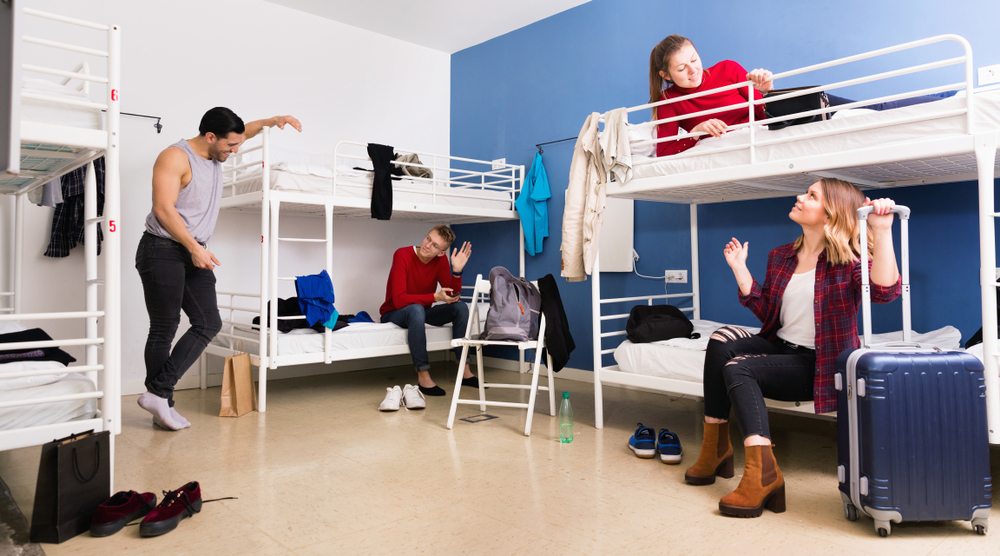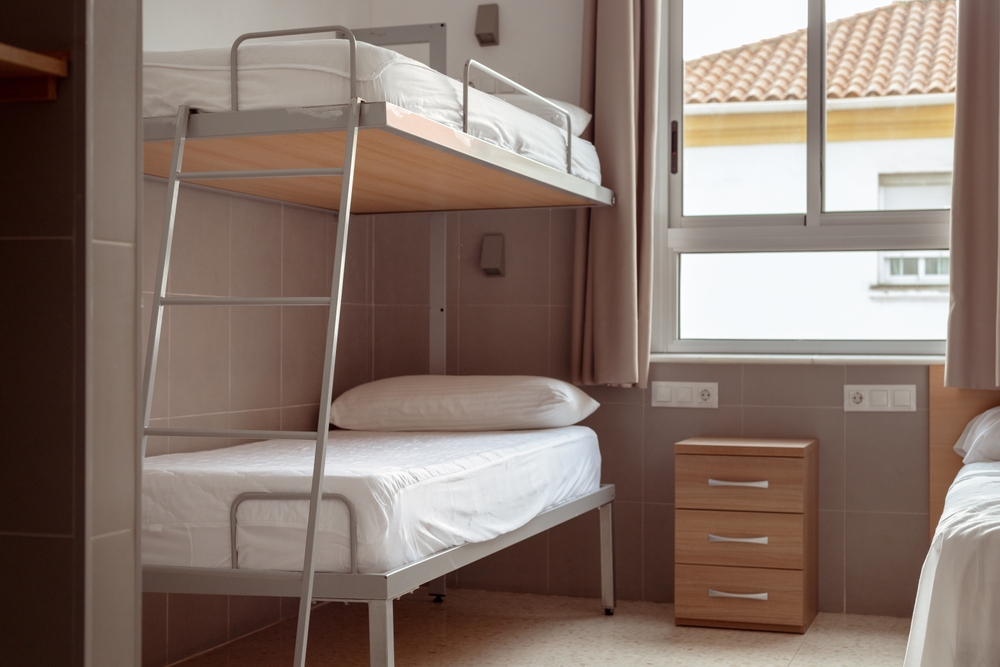Most of Shared Hostel Accommodations
Hostels are budget-friendly accommodations that offer shared living spaces. Travelers can book dormitory-style rooms, often with bunk beds, and share common areas like kitchens, bathrooms, and lounges.
Hostels have gained popularity due to their affordability, social atmosphere, and the opportunity to connect with fellow travelers. They’re no longer exclusive to backpackers; people of all ages and backgrounds choose hostels for unique experiences.
The key to an unforgettable hostel experience is maximizing your time there. From choosing the right hostel to mastering hostel etiquette, we’ll guide you through the process.
Read: Staying Fit on the Road: Quick Workouts for Travelers
Preparing for Your Hostel Adventure
Choosing the Right Hostel
The choice of your hostel is pivotal to the quality of your adventure. Your first step should be to conduct thorough research. Start by considering the location of the hostel. Is it conveniently located near the places you plan to visit? Read reviews from previous guests to get an understanding of the hostel’s atmosphere, cleanliness, and the types of travelers it attracts. Knowing the kind of crowd the hostel caters to can help you find a place that aligns with your preferences and travel style.

Packing Essentials for Hostel Stays
Packing efficiently is crucial. Think about the essentials you’ll need for a comfortable stay. Don’t forget to bring a power bank; hostels may have limited power outlets. A sturdy padlock is a must for securing your belongings in lockers provided by the hostel. Earplugs can be a lifesaver in dormitories, helping you sleep soundly even when others are making noise. Lightweight and versatile travel gear make it easier to move around and enjoy your adventures to the fullest.
Booking Tips and Tricks
When you’ve identified your ideal hostel, it’s time to book your stay. To save money and secure your spot, consider booking well in advance. Some hostels offer discounts or special perks for guests who book directly through their websites or using specific booking platforms. Take advantage of these offers to get the most value for your money. Remember that popular hostels can fill up quickly, especially during peak travel seasons, so early booking is a smart move to avoid disappointment.
Navigating the Shared Spaces
Common Areas: Social Hubs
Common areas within hostels serve as the heartbeat of the social experience. These spaces are where travelers from various backgrounds come together to share stories, experiences, and make connections. It’s crucial to embrace these areas as opportunities for interaction. Whether it’s the lounge, rooftop terrace, or a cozy reading nook, engage with fellow travelers, and don’t be afraid to strike up conversations. You may discover like-minded individuals or even future travel companions.
Kitchen and Dining Hacks
Dining in hostels is not just about saving money; it’s also a chance to bond with other travelers. Hostel kitchens are equipped with the basics for preparing your meals. Learn to cook simple and budget-friendly dishes. Consider organizing a communal dinner with fellow guests, pooling ingredients, and sharing stories over a homemade meal. It’s an excellent way to build connections and savor international flavors without leaving the hostel.
Bathrooms: Staying Clean and Considerate
Communal bathrooms are part and parcel of hostel living. To maintain a clean and considerate environment, adhere to some basic principles. Bring your own toiletries and keep them organized. Avoid leaving personal items scattered in shared bathroom spaces. Clean up after yourself and be mindful of your usage to ensure that the facilities remain pleasant for all guests. Respect privacy by giving others space while they use the bathrooms, and maintain good hygiene throughout your stay.
Sleeping Soundly in a Dormitory
Choosing the Perfect Bunk

Selecting the right bunk bed in a dormitory is a crucial decision. Opting for a bottom bunk has advantages, as it offers easier access and a little more privacy. The bottom bunk is often preferred by those who value convenience and the ability to come and go without disturbing their roommates. If you’re more inclined to enjoy a bit of solitude, consider investing in a top bunk, which can provide a cozier, more private sleeping space. Personalizing your bunk with small touches, such as a curtain or bedside essentials, can make it feel like your own private corner in the shared room.
Noise-Canceling Tips
Dormitories can be bustling with activity, and noise from fellow travelers is a common challenge. Noise-canceling headphones are a traveler’s best friend in such situations. These headphones can help you block out disturbances and create a peaceful environment for a good night’s sleep. Whether it’s someone arriving late, an early riser, or even the occasional snorer, noise-canceling headphones can be a game-changer for a restful night.
Read: Travel Insurance: Navigating the Unseen Risks
Personal Sleep Aids
Sometimes, getting quality sleep in a dormitory setting can be challenging. Personal sleep aids can come to the rescue. Consider bringing a sleep mask to block out ambient light and create a dark sleeping environment. Earplugs are another valuable addition to your travel gear, as they can reduce or eliminate disruptive sounds. Some travelers even find white noise machines or smartphone apps helpful in masking background sounds and promoting better sleep.
Socializing and Making Friends
Icebreakers and Conversation Starters
Socializing in a hostel can be both exciting and intimidating, especially if you’re meeting people from diverse backgrounds. To break the ice, consider using conversation starters like asking fellow travelers about their favorite travel destinations, the most memorable experiences they’ve had, or their future travel plans. These friendly questions can initiate engaging discussions and help you discover shared interests. Remember, everyone is at the hostel to meet new people, so don’t be shy about striking up conversations.
Participating in Hostel Events
Many hostels organize events and activities to encourage social interaction among guests. From movie nights and city tours to game nights and cultural exchanges, these events provide a platform for connecting with fellow travelers. Participating in hostel events not only allows you to engage with others but also offers the opportunity to immerse yourself in the local culture and explore new experiences together.
Respectful Socializing
Respect is a fundamental aspect of socializing in shared accommodations. It’s crucial to be considerate of others’ space, values, and boundaries. Politeness and open-mindedness go a long way in building positive relationships. Be aware of cultural differences and be respectful of diverse backgrounds. Engage in conversations with the intention of understanding and learning from one another. By being a respectful and considerate traveler, you’re more likely to make lasting friendships during your hostel adventure.
Read: Exploring the Unexplored: The Perks of Traveling During Off-Peak Seasons
Staying Safe and Secure
Locking Up Your Valuables
Safety should be a top priority in any hostel adventure. Many hostels offer lockers or personal storage spaces for safeguarding your valuables. Utilize these lockers to protect your passport, electronic devices, travel documents, and any other valuable possessions. It’s advisable to invest in a smaller lock for your backpack or daypack as an additional layer of security when you’re out exploring the local area. By taking these precautions, you can reduce the risk of theft and ensure your important items remain secure.
Emergency Preparedness
While hostels are generally safe, being prepared for unexpected situations is essential. Keep a basic first aid kit on hand, which can be useful for minor injuries or medical issues. Familiarize yourself with the emergency exits and procedures within the hostel, so you’re ready in case of a fire or other emergencies. Additionally, have emergency contact numbers and information readily available, including local authorities and your country’s embassy or consulate, in case you require assistance during your stay.
Trusting Your Instincts
Trusting your instincts is a crucial aspect of staying safe and secure. If something doesn’t feel right, whether it’s a situation or a person, it’s important to take it seriously. Don’t hesitate to seek help from hostel staff or fellow travelers if you ever feel uncomfortable or unsafe. Hostel staff are typically experienced in handling a variety of situations and can provide guidance or assistance. Trusting your instincts and taking appropriate actions can help you avoid potential risks and enjoy a worry-free hostel adventure.
Maintaining Cleanliness
Cleaning Up After Yourself
Hostels are shared spaces, and maintaining cleanliness is a collective responsibility. It’s essential to clean up after yourself in common areas like the kitchen, dining area, and lounge. Whether you’ve prepared a meal or simply used these spaces, leaving them tidy and ready for the next person is a considerate practice. This not only ensures a pleasant environment for everyone but also fosters a sense of community and respect among travelers.
Staying Hygienic
Personal hygiene is another crucial aspect of cleanliness in shared accommodations. Ensure you stay clean and practice good personal hygiene. Bring your own toiletries and use them responsibly. Use designated showers, sinks, and facilities for personal grooming, and keep these areas clean for others to use comfortably. By taking care of your hygiene and respecting the shared facilities, you contribute to a pleasant and hygienic hostel environment.
Contributing to a Clean Environment
Being mindful of environmental impact is an essential part of maintaining cleanliness. Reduce waste by using reusable items whenever possible. Avoid excessive plastic usage and recycle properly. Participate in any eco-friendly initiatives or recycling programs that the hostel may offer. Contributing to a clean environment extends beyond personal hygiene and encompasses shared responsibility for the hostel’s overall cleanliness and sustainability.
Making the Most of the Amenities
Free Breakfast and Other Perks
Many hostels offer complimentary breakfast to guests. Take advantage of this offering, as it’s a great way to save money on your morning meal. These breakfasts typically include essentials like cereals, bread, spreads, and beverages. Beyond breakfast, hostels may offer additional perks, such as free city maps, organized activities, or discounts on local tours. Make sure to inquire about these amenities at the hostel reception, as they can enhance your travel experience without extra cost.
Laundry Facilities
Hostels often provide on-site laundry facilities. Utilizing these facilities can be a practical way to maintain clean and fresh clothing during your journey. Doing laundry in the hostel allows you to pack lighter, avoid costly laundromats, and keep your wardrobe in good condition. Be sure to check the laundry schedule and any associated fees or rules with the hostel’s laundry service.
Group Cooking and Dinner Nights
Some hostels organize group cooking sessions or dinner nights for guests. Participating in these events can be a fantastic way to bond with fellow travelers. These communal meals offer the opportunity to share different cuisines, recipes, and stories from your travels. It’s not just about food; it’s a chance to connect with like-minded individuals, forge new friendships, and create memorable moments during your hostel stay.
Read: House Swapping: A Free Alternative to Hotels
Budgeting for Your Hostel Adventure

Money-Saving Tips
Budgeting is a key aspect of maximizing your hostel adventure. Start by setting a daily spending limit that covers accommodation, food, activities, and incidentals. Consider cooking your meals in the hostel’s kitchen to save on dining expenses. Prioritize free or low-cost attractions and activities, and avoid unnecessary expenses. Keeping track of your spending and sticking to your budget ensures you make the most of your journey without overspending.
Hidden Costs to Watch Out For
While hostels offer budget-friendly accommodations, be aware of potential hidden costs. Read the fine print when booking to understand any additional fees or taxes. Some hostels may charge for services like bed linens, towels, or luggage storage. Clarify these details at check-in to avoid unexpected expenses. Being financially prepared and informed helps you stay within your budget.
Managing Your Travel Expenses
To make the most of your hostel adventure, it’s essential to manage your overall travel expenses. Keep a detailed record of your spending to track your budget. Use travel apps or expense-tracking tools to stay organized. Avoid impulse purchases and prioritize experiences that align with your travel goals. By effectively managing your travel expenses, you can ensure your journey is both enriching and financially sustainable.






